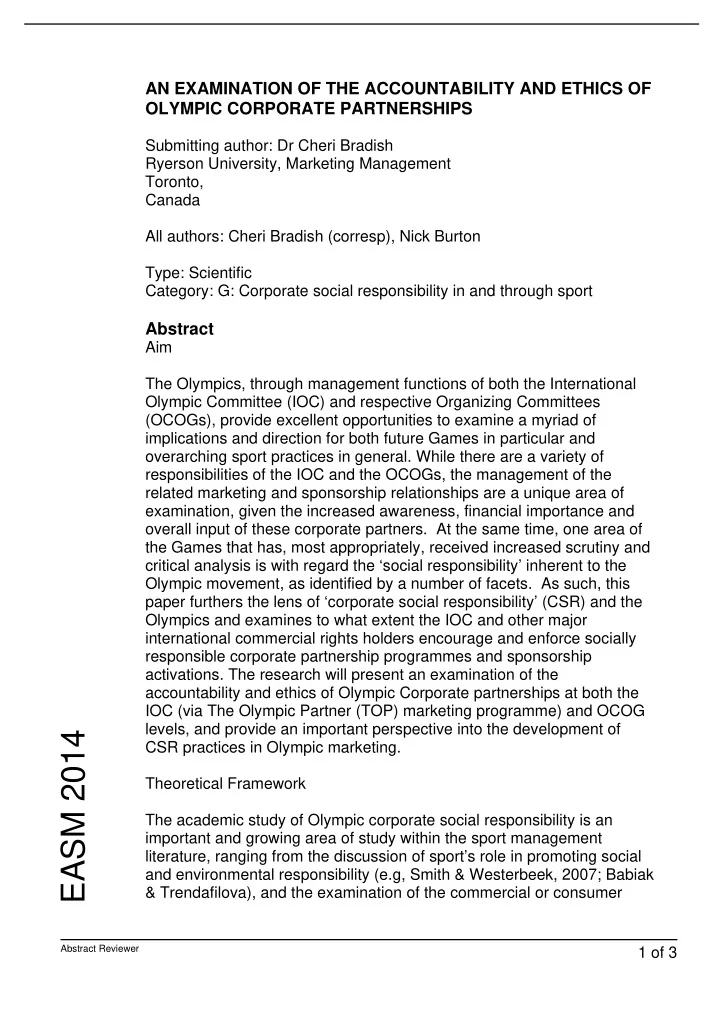

AN EXAMINATION OF THE ACCOUNTABILITY AND ETHICS OF OLYMPIC CORPORATE PARTNERSHIPS Submitting author: Dr Cheri Bradish Ryerson University, Marketing Management Toronto, Canada All authors: Cheri Bradish (corresp), Nick Burton Type: Scientific Category: G: Corporate social responsibility in and through sport Abstract Aim� � The Olympics, through management functions of both the International Olympic Committee (IOC) and respective Organizing Committees (OCOGs), provide excellent opportunities to examine a myriad of implications and direction for both future Games in particular and overarching sport practices in general. While there are a variety of responsibilities of the IOC and the OCOGs, the management of the related marketing and sponsorship relationships are a unique area of examination, given the increased awareness, financial importance and overall input of these corporate partners. At the same time, one area of the Games that has, most appropriately, received increased scrutiny and critical analysis is with regard the ‘social responsibility’ inherent to the Olympic movement, as identified by a number of facets. As such, this paper furthers the lens of ‘corporate social responsibility’ (CSR) and the Olympics and examines to what extent the IOC and other major international commercial rights holders encourage and enforce socially responsible corporate partnership programmes and sponsorship activations. The research will present an examination of the accountability and ethics of Olympic Corporate partnerships at both the IOC (via The Olympic Partner (TOP) marketing programme) and OCOG levels, and provide an important perspective into the development of EASM 2014 CSR practices in Olympic marketing.� � Theoretical Framework� � The academic study of Olympic corporate social responsibility is an important and growing area of study within the sport management literature, ranging from the discussion of sport’s role in promoting social and environmental responsibility (e.g, Smith & Westerbeek, 2007; Babiak & Trendafilova), and the examination of the commercial or consumer Abstract Reviewer 1 of 3
value of implementing CSR-friendly practices (Walker & Kent, 2009). However, within sponsorship theory there remains a dearth of critical examination into the strategic and managerial implications of CSR. Despite the increased prevalence of CSR initiatives amongst Olympic sponsors and corporate partners, there is a need for a more thorough exploration of the potential drivers – and implications – of implementing a more effective CSR framework for Olympic sponsorship.� � Research Design� � In light of these limitations, this research seeks to expand upon our understanding of responsible and socially aware sponsorship practices. Through a mixed methods analysis (to include document analysis), of select Olympic marketing relationships – including London 2012’s partnerships with BP and Cadbury, Sochi 2014’s cadre of oil and gas partners, and the IOC’s Dow Chemical alliance – this study will review key specifics of disconcerting Olympic partnership cases (including business strategies and objectives), associated concerns of social responsibility (ranging from human rights to environmental concerns), in addition to an examination of the related discord between Olympic ethical decision- making and property values (i.e. the spirit Olympism) with questionable partner principles and practices. � � Conclusion and Implications� � Ultimately, this study will present a discussion of ‘future considerations’ for Olympic Games sponsorship programs, and will advance current Olympic marketing understandings and practices as well as build on both the existing Games sponsorship and related Olympic management scholarship. The study will further elaborate upon the corporate social responsibility implications of Olympic sponsorship, and shed new light upon the unique responsibilities and considerations of major event hosts in the contemporary sport sponsorship environment. References References� � Babiak, K. & Trendafilova, S. (2011). CSR and environmental EASM 2014 responsibility: motives and pressures to adopt green management practices. Corporate Social Responsibility and Environmental Management, 18, 11-24.� � Dowling, M., Robinson, L, & Washington, M. (2013). Taking advantage of the London 2012 Olympic Games: corporate social responsibility through sport partnerships. European Sport Management Quarterly, 13(3), 269- 292.� � Abstract Reviewer 2 of 3
Godfrey, P. C. (2009). Corporate social responsibility in sport: An overview and key issues. Journal of Sport Management, 23(6), 698-716.� � � Smith, A. & Westerbeek, H. (2007). Sport as a vehicle for deploying corporate social responsibility. Journal of Corporate Citizenship, 25, 43–54.� � Walker, M. & Kent, A. (2009). Do fans care? assessing the influence of corporate social responsibility on consumer attitudes in the sport industry. Journal of Sport Management, 23(6), 743-769. EASM 2014 Abstract Reviewer 3 of 3
Recommend
More recommend